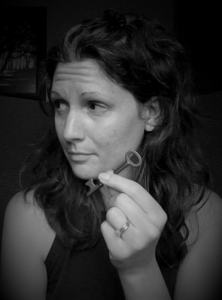By Nils Skudra
This week I had the opportunity to watch “I Can”, a faith-based film based on the true story of Katelyn Pavey, a young girl born with only one fully formed arm who pursues her passion for softball in the face of adversity, with the encouragement of her parents. As a disability-themed film, I felt this would be a worthwhile topic since it delivers an uplifting message of faith and empowerment, including capturing how perseverance and family support can help individuals with disabilities to accomplish their dreams – even when their disability may seem truly debilitating.
The film opens with a flashback of the meeting between Katelyn’s parents Eric (Jeff Armstrong) and Salena (Amanda Verkamp) during a job interview, when both were married to their previous spouses, respectively. Their mutual attraction is immediately apparent, which prompts Eric to hire Salena on the spot. His flirtation with her soon leads to an adulterous affair, resulting in Salena’s pregnancy. Upon Katelyn’s birth, they discover that she has only one fully developed arm, which leaves both parents devastated. Over the subsequent years, Eric is plagued with guilt, believing that God has punished him for his infidelity by giving him a disabled child, which he tries to compensate for by being highly supportive of his daughter.
Seventeen years later, Katelyn (Danner Brown) is an energetic and gifted young softball player, distinguishing herself as a highly talented member of her high school team, coached by her father who insists that she should never be afraid of failure. He reaffirms this conviction by encouraging her to state the words, “I can,” a recurring phrase that plays a central role in shaping her outlook with respect to her disability. During one game, Katelyn’s success is observed by Cory Gardner (Cameron Arnett), a talent scout from Cincinnati Christian University who immediately takes notice of her athletic abilities. At a subsequent board meeting, he expresses his determination to offer Katelyn a scholarship, which is greeted with skepticism by his colleagues, as one of them asks dismissively, “The one-armed girl?” Nonetheless, Mr. Gardner is persistent, declaring that Katelyn is the best player he’s seen and that he would like her to play for his team at CCU. Therefore, he resolves to meet Katelyn at her next game and make the scholarship offer.
Things take a tragic turn, however, when Katelyn suffers a serious knee injury during the game, resulting in her hospitalization. The doctor informs her parents that the estimated timeframe for Katelyn’s recovery will be six to nine months, with the next available surgery taking place in a month. Katelyn is deeply disappointed by this news since softball is her great passion, believing that she has lost her chance of receiving an athletic scholarship and going to college. This also causes friction between her parents, as Salena contests Eric’s position that she wouldn’t understand the ripple effects of Katelyn’s injury, arguing that she fully knew what the ripple effects could be when she began her affair with him. However, Salena is reassuring toward Katelyn, telling her that she has not lost her chance of going to college and that they must have faith in God since everything takes place according to His plan, which may yield a positive outcome.
Despite her parents’ support, Katelyn increasingly takes a pessimistic outlook toward her life, particularly when she is given a wheelchair upon returning to school. She emphatically tells Eric, “Now people will look at me differently. The girl in the wheelchair. I’ve tried so hard not to be seen as different.” This marks a significant departure from Katelyn’s previous confidence, which she has displayed throughout her life despite having only one arm. While most of her peers have embraced and accepted her, she now feels that they will truly see her as a disabled individual once she is in a wheelchair since she can no longer play softball during her recovery. Furthermore, she brings her pessimism to a classroom discussion in Honors English, stating that each of the main protagonists’ tragedies have been consequences of their actions, which reflects her own predicament and that of her father.
However, Katelyn’s life takes a new turn following the death of her grandmother Me-Me (Karen M. Chan), who has consistently reassured her by affirming that “God makes no mistakes.” Katelyn discovers that her sisters, together with Me-Me, put together a video highlighting her accomplishments as a softball player, which has gone viral and attracted the attention of the media. The family’s home is subsequently flooded with numerous news anchors, eager to interview Katelyn about her story, which becomes a source of inspiration for members of the disability community. Furthermore, Eric receives a call from Mr. Gardner, who expresses his desire to meet with them to discuss a potential scholarship offer. Katelyn is delighted by this opportunity but asks Mr. Gardner for his thoughts about working with her as a one-armed athlete, to which he replies, “I wouldn’t treat you any different than the other players. Everyone will have the same expectations.”
Katelyn is subsequently invited to speak at a limb difference conference about her experiences, but the parental friction nonetheless persists between Eric and Salena, who believes that ever since their daughter’s birth, he has been approaching life with the expectation of something negative happening around the corner. She directly confronts Eric about whether he feels that Katelyn’s difference is God’s punishment for their affair, which he cannot bring himself to answer. Salena then affirms that she also felt guilty upon discovering her daughter’s condition, but she states, “I got over it, and I got over me. You will have to stop going through life, thinking that God is punishing you for what we did.” This prompts a profound change in Eric’s outlook, convincing him to train Katelyn to run to first base upon her full recovery. Despite Katelyn’s skepticism, Eric urges her to make the effort to complete the run, once again encouraging her to repeat the words, “I can.” This motivates Katelyn to successfully run to first base without slowing down, leading to her return to softball. Furthermore, after delivering a heartfelt speech at the limb difference conference, Mr. Gardner formally awards her an athletic scholarship to CCU, which she enthusiastically accepts. The concluding epilogue states that Katelyn went on to lead CCU’s softball team to win a record series of games, while Eric now gives motivational speeches to prison inmates throughout Indiana.
I Can delivers a beautiful and moving portrayal of Katelyn’s struggle to overcome adversity and the ways in which it affected both her own and her parents’ lives. Through a compelling story arc and heartfelt performances, the film poignantly captures how individuals born with limb differences can accomplish their dreams through personal determination, faith, and the support of their families. This message resonates with the disability community more broadly, as people with various types of disabilities strive for academic and professional success. By watching this film, viewers can hopefully be inspired to support their family members with disabilities to pursue their goals, while taking the lesson that they should never see these disabilities as a punishment or consequence of their past actions.

I am an artist on the autism spectrum. I received an MA specializing in Civil War/Reconstruction history at the University of North Carolina, Greensboro, and I have been drawing hundreds of Civil War-themed pictures since the age of five and a half. I recently completed a secondary Master’s in Library and Information Sciences. As a person with autism, I have a very focused set of interests, and the Civil War is my favorite historical event within that range of interests. It is therefore my fervent desire to become a Civil War historian and have my Civil War artwork published in an art book for children. I am also very involved in the autism community and currently serve as the President/Head Officer of Spectrum at UNCG, an organization I founded for students on the autism spectrum. The goal of the organization is to promote autism awareness and foster an inclusive community for autistic students on the UNCG campus. The group has attracted some local publicity and is steadily gaining new members, and we shall be hosting autism panels for classes on campus in the near future.








